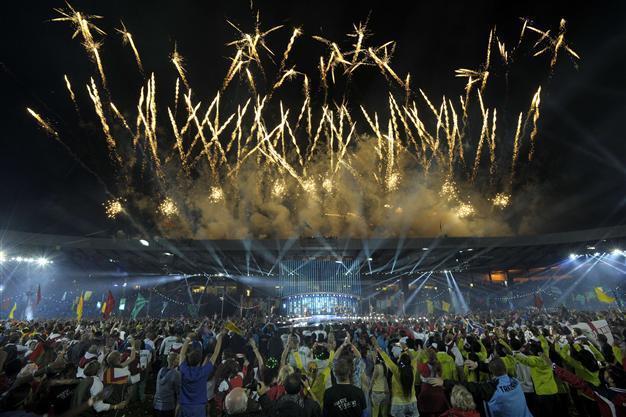Glasgow reignites 'Friendly Games'
GLASGOW - Agence France-Presse

Fireworks light up the sky during the closing ceremony of the 2014 Commonwealth Games at Hampden Park in Glasgow, Scotland, on August 3, 2014. AFP Photo
After disappointing in Delhi in 2010, the Commonwealth Games in Glasgow were hailed as an unmitigated success, drawing some of the sporting world's top stars and packed crowds to venues.
The low-key Delhi Games were quickly forgotten as Scotland's biggest city warmly embraced more than 4,000 athletes from 71 nations, 53 of them former British colonies, the rest mainly territories or dependencies.
"Glasgow you really have delivered in every aspect the best Games ever," Commonwealth Games Federation president Prince Tunku Imran said.
Opened in blisteringly hot conditions, the balmy weather eventually receded to ensure a traditionally wetter climax.
But the rain did not dampen the spirit and enthusiasm on view at a host of top venues including Celtic Park, Ibrox and Hampden Park.
Needless to say, Usain Bolt grabbed the headlines, the Jamaican sprint legend anchoring his team to gold in the men's 4x100m relay.
He had caused controversy in the lead-up to that after The Times reported that he had dubbed the Games a "bit shit".
Bolt, with six Olympic and eight world gold medals to his name, was vehement in his denial of the story.
"The people were good, the food great and the energy was outstanding," said Bolt, who revelled as a vibrant Hampden Park afforded him a hero's welcome.
East African giants Kenya topped the track and field medals table with 23 in total, including 10 golds, 10 silvers and three bronzes, with Bolt's Jamaica second with 19 (10-3-6).
There was no doubt that the outstanding overall performance on the track came not from Jamaica but the Kenyan women's team, who won 13 of all 18 medals on offer between 800m and marathon, including all six golds.
It was England who topped the overall medal table ahead of arch-rivals Australia, who will host the 2018 Games in Gold Coast, and Canada, with hosts Scotland finishing an unexpected fourth.
Australia once again led the way in the pool, winning 19 of the 44 gold medals on offer, but their dominance was challenged by the home nations as England claimed 10 gold medals, Scotland three and Wales their first female golds in the pool for 40 years thanks to Jazz Carlin and Georgia Davies.
The Aussie women led the way with 11 golds in total, including three apiece for Emma Mckeown and Cate Campbell, whilst England's Fran Halsall bounced back from a disappointing couple of years to take double sprint gold in the 50m butterfly and freestyle.
There were also three gold medals for South Africa thanks to Olympic champions Chad le Clos and Cameron van der Burgh with Le Clos ending a remarkable meet with a total of seven medals.
However, Van der Burgh was beaten in his preferred event, the 100m breaststroke, by 19-year-old English sensation Adam Peaty, who also played a huge part in his team's medley relay gold as he swam his leg over a second faster than Australian world champion Christian Sprenger.
Australia dominated on the track as they won 20 medals including seven gold. Anna Meares successfully defended her 500m time trial title and won silver in the sprint to join New Zealand's Gary Anderson as the most decorated cyclist in Games history with eight medals.
New Zealand's men won four titles in the Velodrome to end a 12-year drought with Sam Webster's double gold in the individual and team sprint, more success coming for the Kiwis with Linda Villumsen taking the time trial gold and Anton Cooper winning the mountain bike event.
England had success in the form of Olympic champions Joanna Rowsell and Laura Trott as they claimed the 3000m pursuit and 25km points race respectively but the men were left without a gold on the track for a second successive games.
Alex Dowsett showed them the way as he won the time trial while Lizzie Armitstead went one better than New Dehli as she won gold in the women's road race.
A dramatic finale saw Geraint Thomas became the first Welsh winner of the road race.
South Africa trumped New Zealand for gold in the rugby sevens, a sport that will feature in the Rio Olympics in 2016.
The Games were relatively free of doping cases, the highest profile that of former world 400 metres champion Amantle Montsho of Botswana, who tested positive for the banned stimulant methylhexaneamine.
Welsh 400m hurdler Rhys Williams, son of 1970s Wales and Lions rugby legend JJ, was withdrawn before competition after failing a test.
And 16-year-old Nigerian weightlifter Chika Amalaha was stripped of her gold medal after testing positive for amiloride and hydrochlorothiazide, both prohibited as diuretics and masking agents.
Mike Hooper, CEO of the Commonwealth Games Federation, summed up the 11 days of action.
"These have been, in my view, the stand-out Games in the history of the movement," said Hooper.
